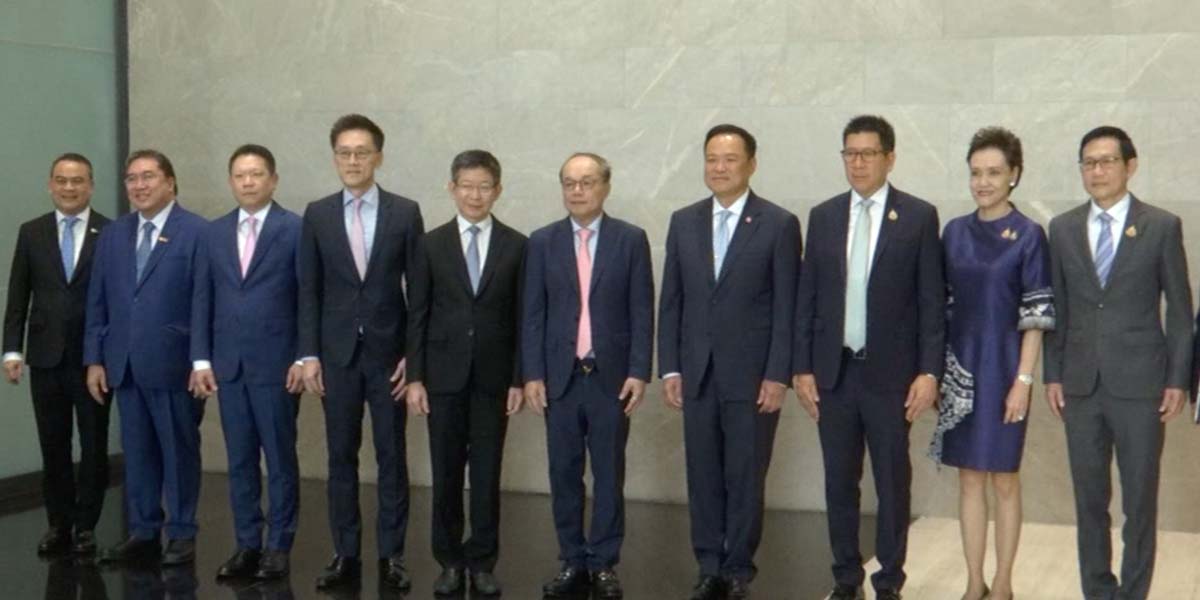On Thursday, Prime Minister Anutin Charnvirakul, together with his delegation, will meet with the Federation of Thai Capital Market Organizations (FETCO) under the theme “Capital Market Proposals to Empower the Government” at the Stock Exchange of Thailand (SET) building.
The attending cabinet ministers include Dr. Ekniti Nitithanprapas, Deputy Prime Minister and Minister of Finance; Ms. Suphajee Suthumpun, Minister of Commerce; Auttapol Rerkpiboon, Minister of Energy; and Vorapak Tanyawong, Deputy Minister of Finance.
The purpose of PM Anutin and the economic team’s visit to the SET is to discuss under the topic “Capital Market Proposals to Empower the Government.” This includes meeting with SET executives and listening to FETCO’s proposals regarding the capital market development to build investor confidence and strengthen long-term stability.
Regarding the proposals from FETCO to be discussed with the Prime Minister and the economic team, Paiboon Nalinthrangkurn, President of the Investment Analysts Association and member of the SET Board, previously revealed that greater political clarity and improved investor confidence in PM Anutin’s economic team—especially the revival of the “Half-Half” co-payment initiative—should immediately stimulate consumption upon implementation.
Meanwhile, this economic team, especially the Minister of Finance, Dr. Ekniti, has a deep understanding of Thailand’s issues, both immediate and structural problems, as well as the need to enhance the country’s long-term growth potential. Although PM Anutin’s administration may only have 6–7 months to govern, it is believed to be sufficient for implementing short-term policies and laying the groundwork for strategic structural reforms.
Paiboon added that the problem with the Thai stock market is not just falling share prices, but more seriously, its declining effectiveness as a capital-raising source for businesses. One of the stock market’s main roles is to serve as a financing pillar to elevate the economy, since economic upgrading or high-value investments in new industries require both “capital” and “borrowed funds.”
Another key issue is that the Thai stock market has too many short-term investors, resulting in high market volatility and stock prices failing to adequately reflect the companies’ long-term value, which hinders fundraising. Currently, short-term investors focused on trading rather than long-term holding are estimated to account for as much as 70–75% of trading value, causing the Thai stock market to resemble a trading market more than an investment market.
Paiboon said that the first thing the Anutin government should do is promote long-term investment in the stock market, which he believes will provide the essential foundation for a sustainable recovery.
The proposals to increase long-term investors include:
1) Exempt dividend tax for investors holding Thai shares for over one year.
2) Allow a personal income tax deduction for direct equity investment in the stock market, up to 500,000 baht per individual per year, provided the investment is held for at least three years, with flexibility to switch between stocks.
3) Continue supporting investment in Thai ESG funds with the same limit of THB 300,000 per person, making it permanent to avoid the time bomb phenomenon of previous LTF funds.
4) Attract investment from insurance companies by lowering the capital charge for investing in the Thai stock market from 25% to 10%, incentivizing higher allocations to Thai equities.
5) Encourage government-supervised organizations, such as the Social Security Office and the Government Pension Fund, to increase their investment in Thai stocks.
If PM Anutin’s government supports long-term investment in the Thai stock market alongside ongoing economic problem-solving, the chances of seeing the market sustainably return to a bull phase and fulfill its role as an efficient funding source are very high, Paiboon stated.
Dr. Kobsak Pootrakool, Senior Executive Vice President of Bangkok Bank Public Company Limited (SET: BBL) and Chairman of FETCO, also expressed the desire for the government to promote the TISA (Thailand Individual Savings Account) concept—a savings account for investment in stocks that offers tax benefits to those buying shares in the SET. TISA is designed as a tool to encourage the public to invest more in Thai equities.
The TISA package, which FETCO plans to propose to the Minister of Finance, will also encompass the renewal of Super Savings Funds (SSF), which reach maturity in 2025. All necessary information has been prepared by FETCO and its members, who are confident that the finance minister understands and is ready to advance policies beneficial to the Thai capital market.
Meanwhile, Krungsri Securities, commented that the visit by PM Anutin and his economic team should create a positive sentiment on the Thai stock market, as this meeting with the SET and FETCO will discuss approaches to maintain market stability and guide government support for capital market development. Daol Securities (Thailand) also echoed Kriungsri’s comment on the meeting.





